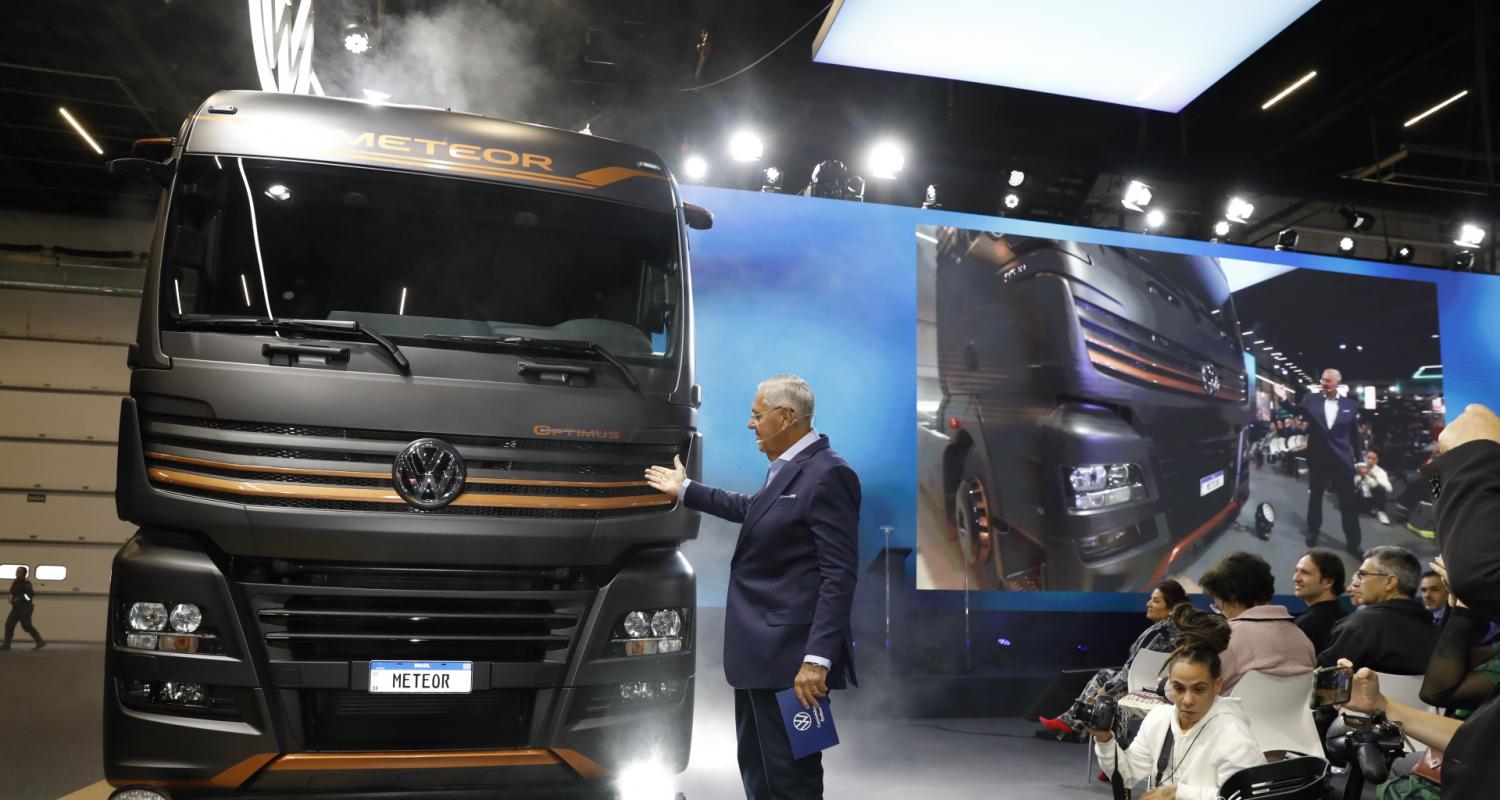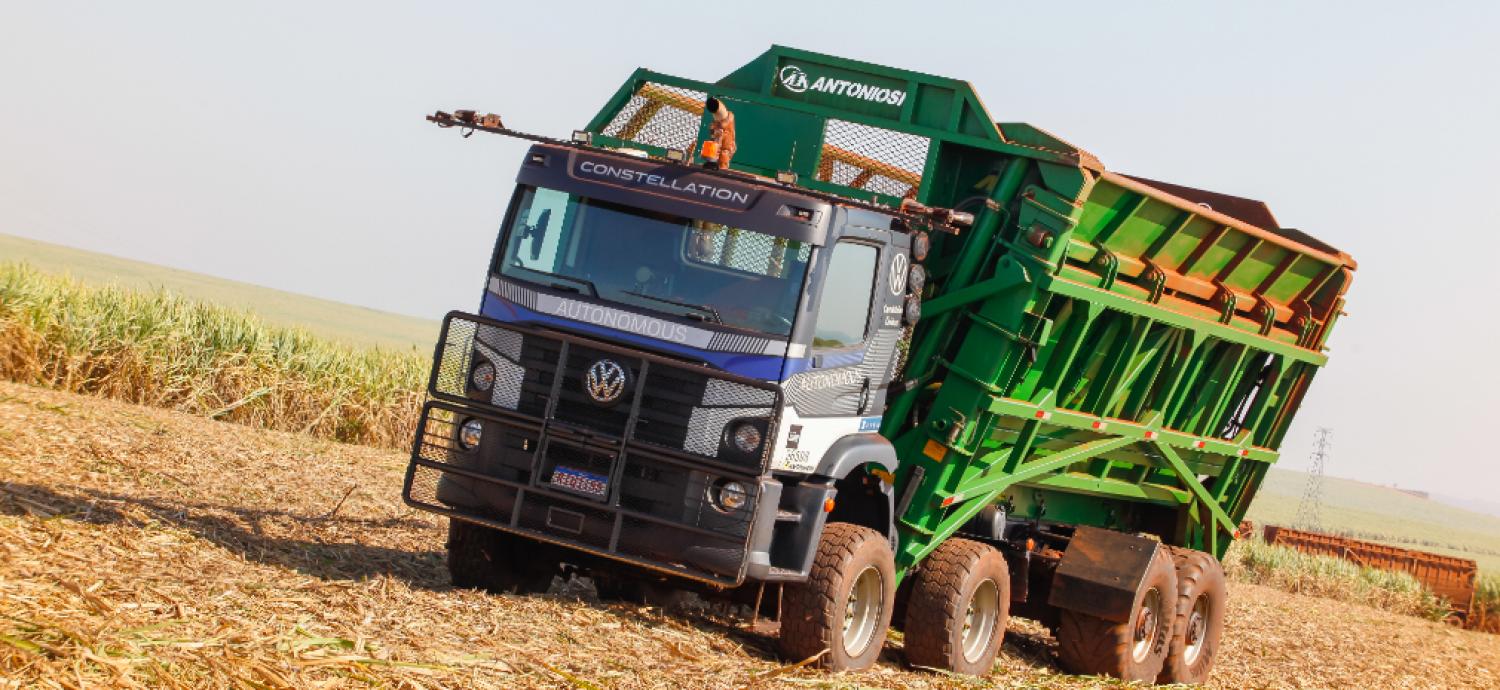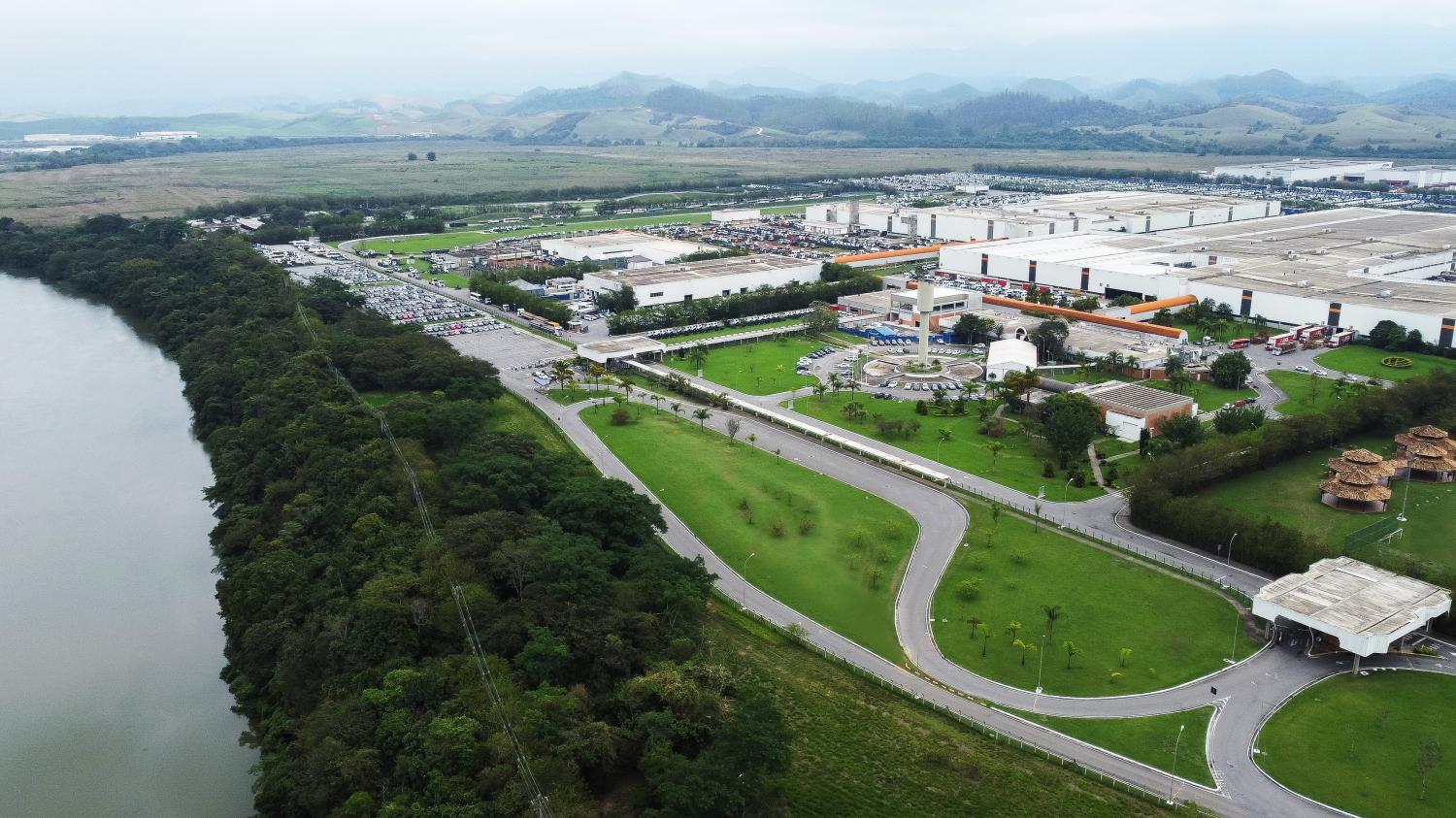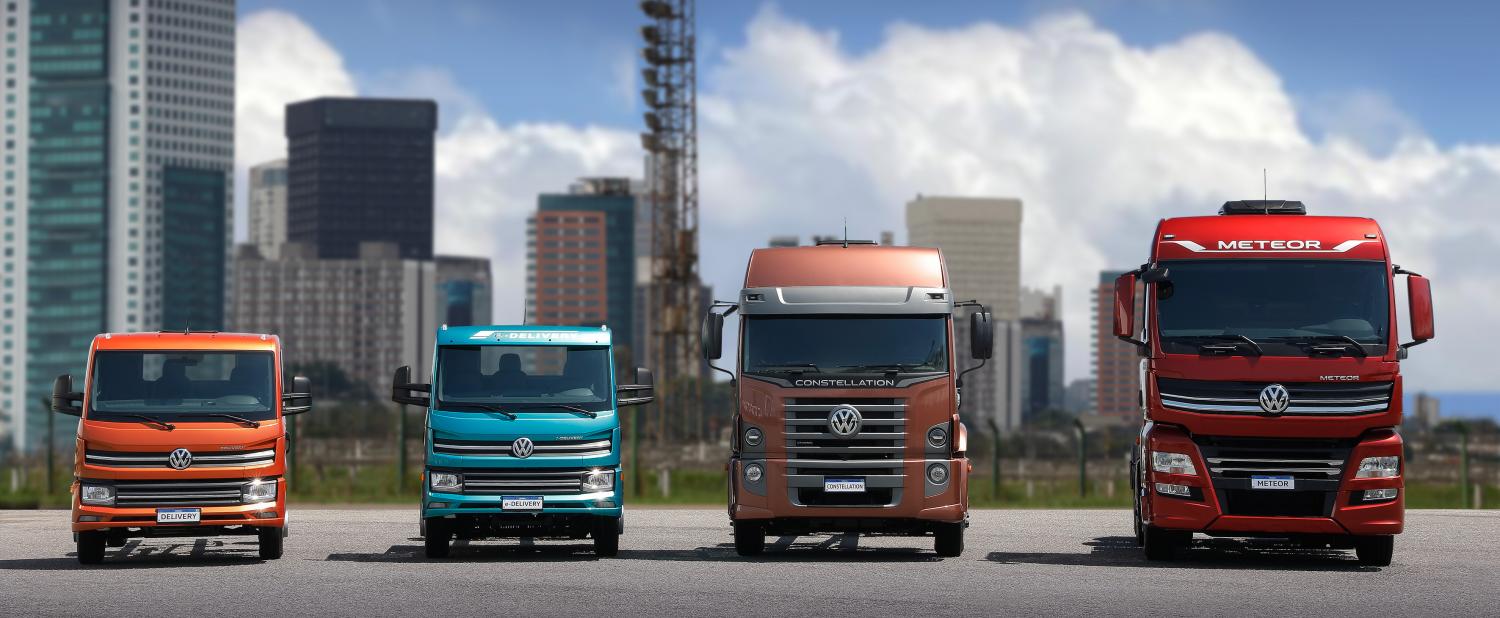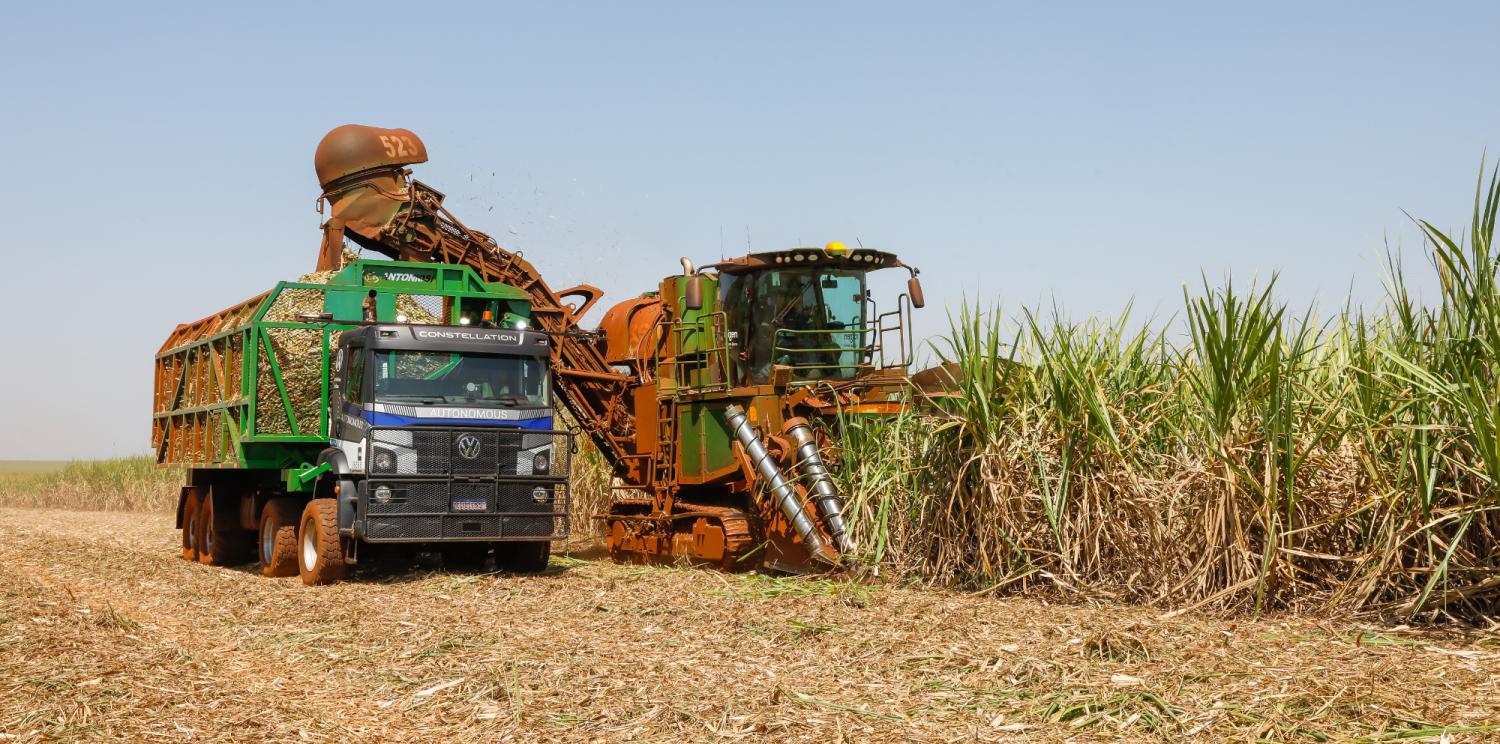First sale of Volkswagen self-driving truck made to Vamos Group
- The twenty units sold will be leased for use in agribusiness
- Vehicle 100% developed in Brazil
Volkswagen Truck & Bus officially entered the era of autonomous vehicles and has already received a large-scale order from Vamos, a leader and pioneer in the leasing and sale of trucks, machinery and equipment offering a wide-ranging network of dealerships for new and previously-owned vehicles. Twenty units of the VW Constellation 31.280 8x4 will be made available for the purpose of leasing in the agribusiness area. The sale was announced today (November 7) by Roberto Cortes, President and CEO of Volkswagen Truck & Bus, during a press conference held at the International Freight Transport Trade Show – Fenatran.
“We are starting off on the right foot yet again, celebrating the first sales of this model immediately after having announced the start of field testing. Vamos Group will be the first company to purchase self-driving Constellation trucks, and we are very pleased to be announcing this new partnership. We expect to able to start delivering these vehicles during the first few months of 2023”, Cortes stated.
Completely developed and tested in Brazil, the VW Constellation 31.280 8x4 relies on electric power steering that is capable of interfacing with its onboard technology. In addition to its electric power steering system, the vehicle is equipped with an advanced real-time geopositioning system (Real Time Kinematic or RTK), which identifies the vehicle’s position and allows it to follows a pre-programmed route with an accuracy of 2.5 cm while presenting minimal variations, a feat that is impossible to achieve in human vehicle operation.
Another important advantage that is currently being tested is VWTB’s exclusive camera system, which replaces traditional mirrors and offers a 360° view around the vehicle, as well as provides increased visibility while operating the vehicle at night.
"Vamos Group is leading the way in the leasing of Volkswagen trucks and buses and is also the largest member of our network of authorized dealers. The company’s preference for our products is a testament to the excellence and versatility that VWTB offers on a market as demanding as Brazil. We hope to be able to once again respond to the expectations and demands of a client of this size”, Ricardo Alouche, Vice President of Sales, Marketing and Services at the assembler, affirmed.
Vamos is a pioneer in the heavy vehicle leasing sector in Brazil and offers a significant growth potential on the market, given that only 1% of the Brazil’s fleet of trucks is currently leased. Vamos Locação model provides savings of up to 30% in fleet costs, as it allows clients to focus on their main business activities, without having to worry about documentation and maintenance. In addition to offering significant savings, leasing also contributes to the renewal and modernization of fleets, thereby helping to reduce the sector’s carbon footprint.
“The purchase of Volkswagen's autonomous trucks will increase the size of the fleet currently available within the agribusiness sector, which is rapidly expanding and offers a wide range of new business opportunities. We are investing in VWTB’s technology in order to offer our clients new solutions and are therefore honored to be the first company purchasing this model from Volkswagen in Brazil”, Gustavo Couto, Vamos’ CEO, stated.
Durability in transport
The VW Constellation 31.280 8x4 is synonymous with durability. The Constellation 31.280’s front axle provides a technical capacity of 8 tons, and its rear axle, which is fitted with a hub reduction, has a capacity of 13 tons. The vehicle’s Gross Vehicle Weight (GVW) is 42 tons, and it makes use of high flotation tires that minimize compacting of the soil and increase traction. The vehicle’s 3-meter wide gauge axles, combined with its reinforced suspension, which has been adjusted for this type of operation, provide increased lateral stability in all conditions.
The Constellation 31.280’s 8x4 traction system, with the addition of the renowned D08 280 cv engine with automated 12-speed transmission, guarantees a high level of performance on any terrain, in addition to increased comfort for drivers and availability and durability of the components of the powertrain system.
The Constellation 31.280’s sugarcane kit provides the model with several items that allow the truck to be adapted for operation in the sugar-alcohol segment, including a "bush break" front end protection grille; a vertical exhaust system, agricultural pre-filter, lower radiator "steel chest" guard, a guard that protects the alternator from straw; thermal protection in the vehicle’s pneumatic system piping (brake system), a radiator protection screen, air intakes for use in cleaning the cabin and the front grille, an electrical wiring harness offering robust protection, power take-off, among other features.
About Vamos
Vamos (VAMO3) is part of the Simpar Group and is a market leader in the leasing of trucks, machinery and equipment, with more than 38 thousand vehicles leased and operations located throughout Brazil’s national territory. A pioneer in the leasing segment, Vamos offers an extensive network of dealerships that includes 41 company-owned retail locations for the brands Transrio (Volkswagen Truck & Bus), Fendt (premium agricultural machinery), Valtra (agricultural machinery and equipment), and Komatsu (distributor of lines of yellow machinery and equipment), as well as 11 retail locations for previously-owned vehicles. In January 2021, the company made its Initial Public Offering and in its first year of trading on São Paulo’s B3 stock exchange received a Transparency Award from ANEFAC, as well as Exame Magazine’s award for the Transport, Logistics, and Logistics Services segment. Learn more at www.amos.com.br.
About Volkswagen Truck & Bus
Part of the TRATON Group, Volkswagen Truck & Bus offers a complete portfolio of solutions for the transporting of cargo and passengers and is one of Latin America’s largest vehicle assemblers. Brazil is VWTB’s global center for research and development, and the company has established itself as a specialist in emerging markets for vehicles that are tailormade in accordance with clients’ specific needs. Since 1981, when VWTB first started its operations, the company has outpaced competitors on the marketplace. Meeting the needs of clients by offering the most ideal cost-benefit ratio has always been the assembler’s main focus. And that's precisely what VWTB offers: customized trucks and buses, excellent after-sales service and an extensive range of available services.

